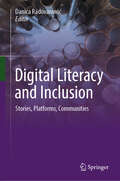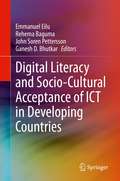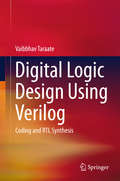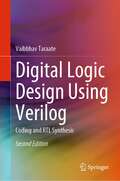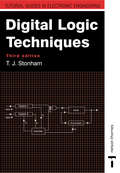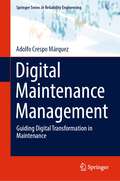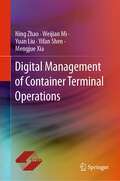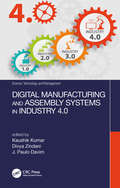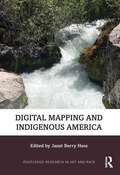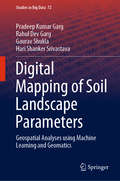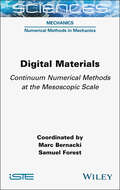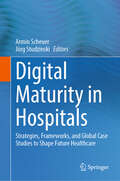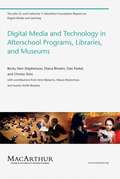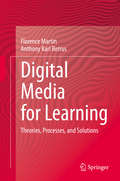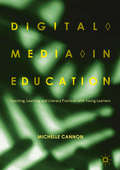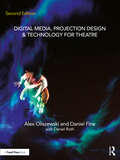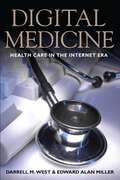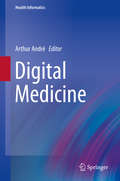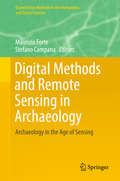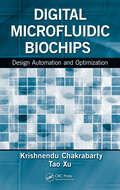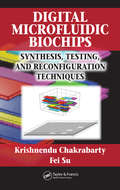- Table View
- List View
Digital Literacy and Inclusion: Stories, Platforms, Communities
by Danica RadovanovićAmid the opportunities and challenges we face at the dawn of the fifth industrial revolution, Digital Literacy and Inclusion presents a carefully curated selection of case studies, theories, research, and best practices based on digital literacy as a prerequisite for effective digital inclusion.More than a dozen experts provide deep insights in stories, research reports, and geographical studies of digital literacy and inclusion models, all from a multi-disciplinary perspective that includes engineering, social sciences, and education. Digital Literacy and Inclusion also highlights a showcase of real-world digital literacy initiatives that have been adopted by communities of practice around the globe.Contributors explore myriad aspects and modalities of digital literacy: digital skills related to creativity, urban data literacy, digital citizenship skills, digital literacy in education, connectivity literacy, online safety skills, problem-solving and critical-thinking digital skills, data literacy skills, mobile digital literacy, algorithmic digital skills, digital health skills, etc. They share the principles and techniques behind successful initiatives and examine the dynamics and structures that enable communities to achieve digital literacy efficiently and sustainably. Their practical solutions, propositions, and findings provide theoretically grounded and evidence-based facts that inform interventions intended to ensure that all citizens have and can enhance their digital literacy while meaningfully and responsibly participating in the digital economy and society.The ideas and histories in this book will appeal to scholars and researchers in the social sciences, engineering, education, sustainable digital technologies, and transformation, and will also be of interest to practitioners in industry, policy, and government.
Digital Literacy and Socio-Cultural Acceptance of ICT in Developing Countries
by Emmanuel Eilu Rehema Baguma John Soren Pettersson Ganesh D. BhutkarThis book discusses the role of human computer interaction (HCI) design in fostering digital literacy and promoting socio-cultural acceptance and usage of the latest ICT innovations in developing countries. The book presents techniques, theories, case studies, and methodologies in HCI design approaches that have been used to foster digital literacy, break the socio-cultural barriers to ICT adoption, and promote the widespread usage of the latest innovations in the health, agriculture, economic, education and social sectors in developing countries. The authors provide insights on how crossing disciplines in HCI such as usability design, user centered design, user experience, anticipated user experience, technology acceptance design, persuasive design, philosophical designs, motivational design, social-cultural oriented designs, and other HCI design approaches have promoted digital literacy and stimulated socio-cultural acceptance and the usage of the latest ICT innovations. The book is relevant in academic, industry and government.Presents theoretical, practical, and socio-cultural approaches to digital literacy challenges in developing countries;Discusses recent ICT and HCI innovations used to transform the health, agriculture, economic, education and social sectors in developing countries;Provides insights on design opportunities and challenges presented in countries where digital literacy is very low and with complex socio-cultural dynamics.
Digital Logic Design Using Verilog
by Vaibbhav TaraateThis book is designed to serve as a hands-on professional reference with additional utility as a textbook for upper undergraduate and some graduate courses in digital logic design. This book is organized in such a way that that it can describe a number of RTL design scenarios, from simple to complex. The book constructs the logic design story from the fundamentals of logic design to advanced RTL design concepts. Keeping in view the importance of miniaturization today, the book gives practical information on the issues with ASIC RTL design and how to overcome these concerns. It clearly explains how to write an efficient RTL code and how to improve design performance. The book also describes advanced RTL design concepts such as low-power design, multiple clock-domain design, and SOC-based design. The practical orientation of the book makes it ideal for training programs for practicing design engineers and for short-term vocational programs. The contents of the book will also make it a useful read for students and hobbyists.
Digital Logic Design Using Verilog: Coding and RTL Synthesis
by Vaibbhav TaraateThis second edition focuses on the thought process of digital design and implementation in the context of VLSI and system design. It covers the Verilog 2001 and Verilog 2005 RTL design styles, constructs and the optimization at the RTL and synthesis level. The book also covers the logic synthesis, low power, multiple clock domain design concepts and design performance improvement techniques. The book includes 250 design examples/illustrations and 100 exercise questions. This volume can be used as a core or supplementary text in undergraduate courses on logic design and as a text for professional and vocational coursework. In addition, it will be a hands-on professional reference and a self-study aid for hobbyists.
Digital Logic Techniques
by John StonhamThe third edition of Digital Logic Techniques provides a clear and comprehensive treatment of the representation of data, operations on data, combinational logic design, sequential logic, computer architecture, and practical digital circuits. A wealth of exercises and worked examples in each chapter give students valuable experience in applying the concepts and techniques discussed.Beginning with an objective comparison between analogue and digital representation of data, the author presents the Boolean algebra framework for digital electronics, develops combinational logic design from first principles, and presents cellular logic as an alternative structure more relevant than canonical forms to VLSI implementation. He then addresses sequential logic design and develops a strategy for designing finite state machines, giving students a solid foundation for more advanced studies in automata theory.The second half of the book focuses on the digital system as an entity. Here the author examines the implementation of logic systems in programmable hardware, outlines the specification of a system, explores arithmetic processors, and elucidates fault diagnosis. The final chapter examines the electrical properties of logic components, compares the different logic families, and highlights the problems that can arise in constructing practical hardware systems.
Digital Maintenance Management: Guiding Digital Transformation in Maintenance (Springer Series in Reliability Engineering)
by Adolfo Crespo MárquezThis book provides a thorough overview of the integration of cyber-physical systems and maintenance management models. It begins by explaining the fundamental concepts behind maintenance digital transformation. It discusses key decision areas in digital maintenance management, particularly focusing on strategic dimensions of maintenance, digital twin definition and strategy, and industry 4.0 digital tools frameworks to support emerging maintenance processes. Furthermore, the monograph dedicates time to the integration of digital maintenance with the entire digital factory. By presenting the possibilities for asset utilization improvement and for asset value enhancements, Digital Maintenance Management provides engineers and practitioners responsible for the management of complex industrial assets a complete guide to piloting the maintenance digital transformation.
Digital Management of Container Terminal Operations
by Ning Zhao Yuan Liu Weijian Mi Yifan Shen Mengjue XiaThis book presents a comprehensive study on intelligent container terminals. Based on the development experience gained to date with container terminals, it analyzes information flows and their interactions with container terminals; illustrates the operation management process from information collection to resource planning and from equipment scheduling to field operation; highlights several dynamic decision-making problems concerning digital operation processes and container terminals; reveals the basis of the discrete logistics system; and discusses the future of intelligent container terminals.
Digital Manufacturing and Assembly Systems in Industry 4.0 (Science, Technology, and Management)
by J. Paulo Davim Kaushik Kumar Divya ZindaniManufacturing, like other industries, is rising to the challenges imposed by aggressive consumer demands and the need for cost-effective processing that delivers quality in the fastest possible time. Fierce competition means that keeping abreast of new developments and applications in technology is essential if companies are to meet demands profitably and keep ahead of competitors. This book investigates the design and management of digital manufacturing and assembly systems for an efficient, flexible, and modular production of customized products using the I40 (industry 4.0)-enabling technologies. This book will also provide case studies covering modeling, simulation, and optimization. eBook includes color figures. Discusses how the advancement of data communication and storage through the Internet of Things (IoT) opens the possibilities of connecting sensors, robots, and devices Sheds light on how the human role in industry is decreasing due to the development of connected manufacturing floors, allowing them to take more control over the manufacturing processes, decisions, and even maintenance Covers the benefits from exploiting digital manufacturing, manufacturing enterprises, and what they expect to achieve Explains the important roles that modeling, simulation, and optimization play Investigates the design and management of digital manufacturing and assembly systems for an efficient, flexible, and modular production of customized products exploiting the I40 (industry 4.0)-enabling technologies
Digital Mapping and Indigenous America (Routledge Research in Art and Race)
by Janet Berry HessEmploying anthropology, field research, and humanities methodologies as well as digital cartography, and foregrounding the voices of Indigenous scholars, this text examines digital projects currently underway, and includes alternative modes of "mapping" Native American, Alaskan Native, Indigenous Hawaiian and First Nations land. The work of both established and emerging scholars addressing a range of geographic regions and cultural issues is also represented. Issues addressed include the history of maps made by Native Americans; healing and reconciliation projects related to boarding schools; language and land reclamation; Western cartographic maps created in collaboration with Indigenous nations; and digital resources that combine maps with narrative, art, and film, along with chapters on archaeology, place naming, and the digital presence of elders. This text is of interest to scholars working in history, cultural studies, anthropology, Native American studies, and digital cartography.
Digital Mapping of Soil Landscape Parameters: Geospatial Analyses using Machine Learning and Geomatics (Studies in Big Data #72)
by Pradeep Kumar Garg Rahul Dev Garg Gaurav Shukla Hari Shanker SrivastavaThis book addresses the mapping of soil-landscape parameters in the geospatial domain. It begins by discussing the fundamental concepts, and then explains how machine learning and geomatics can be applied for more efficient mapping and to improve our understanding and management of ‘soil’. The judicious utilization of a piece of land is one of the biggest and most important current challenges, especially in light of the rapid global urbanization, which requires continuous monitoring of resource consumption. The book provides a clear overview of how machine learning can be used to analyze remote sensing data to monitor the key parameters, below, at, and above the surface. It not only offers insights into the approaches, but also allows readers to learn about the challenges and issues associated with the digital mapping of these parameters and to gain a better understanding of the selection of data to represent soil-landscape relationships as well as the complex and interconnected links between soil-landscape parameters under a range of soil and climatic conditions. Lastly, the book sheds light on using the network of satellite-based Earth observations to provide solutions toward smart farming and smart land management.
Digital Marketing All-In-One For Dummies
by Stephanie DiamondDevelop and refine your comprehensive online marketing plan With more than 800 content-packed pages, Digital Marketing All-in-One For Dummies is the most comprehensive tool for marketers looking to beef up their online presence. In this edition, you’ll learn the latest trends in digital marketing strategies, including brand new insight on how to incorporate artificial intelligence into your marketing plans. You’ll also get the latest information on how to manage your customers’ experiences, create exceptional marketing content, get help from influencers, and leverage social accounts for more followers and greater profits. With the help of this friendly Dummies guide, you’ll accelerate your journey from traditional to digital marketing processes, uncover tips to prove ROI of marketing activities, and increase audience engagement. Build and implement a winning digital plan for your brand Learn how to establish an online presence with social media Turn online prospects into loyal customers Target consumers in any market segment and age bracketDig into the latest marketing advice as you provide your potential and existing customers the kind of personal experience you look for as a customer.
Digital Materials: Continuum Numerical Methods at the Mesoscopic Scale
by Samuel Forest Marc BernackiDigital materials are integral to the modern design methods for industrial components and structures, allowing mechanical properties to be predicted from a description of the microstructure and behavior laws of the constituent parts. This book examines a wide range of material properties, from transport phenomena to the mechanics of materials and microstructure changes in physical metallurgy. The fundamental mechanisms of deformation, annealing and damage to materials involve complex atomic processes; these have been explored and studied by numerical simulations, such as molecular dynamics. In contrast to this minutely detailed approach, Digital Materials explores how these mechanisms can instead be integrated into an approach that considers the continuum of the physics and mechanics of materials at the mesoscopic scale. The book thus focuses on the mechanics of continuous media and the continuum thermodynamics of irreversible processes. The models displayed take the myriad properties of different materials into account, in particular their polycrystalline and/or composite natures; this becomes an intermediate step toward establishing effective laws for engineers in the processes of structure calculation and manufacturing.
Digital Maturity in Hospitals: Strategies, Frameworks, and Global Case Studies to Shape Future Healthcare
by Armin Scheuer Jörg StudzinskiThis book serves as a comprehensive guide for hospitals embarking on a digital maturity journey, offering actionable insights, best practices, and lessons learned from healthcare leaders worldwide. It brings together contributions from over 50 world-renowned digital health experts, providing hospitals with the tools and strategies needed to successfully drive digital transformation to benefit both healthcare workers and patients. Covering a broad range of topics, the chapters delve into critical dimensions of hospital digitalization, including digital maturity models, IT capability, interoperability, governance, patient-centered care, and advanced data analytics. Readers will find real-world case studies showcasing hospitals and governmental initiatives that have achieved externally validated success in their digital transformation efforts. As emphasized in the Foreword written by the President of the International Diabetes Federation, the book highlights the impact of digital maturity on patient care and explores forward-looking trends that will shape the future of healthcare digitalization, such as green IT, ethical considerations, social determinants of health, and workforce development. Whether you are a healthcare leader, policy maker, or practitioner, this book offers valuable guidance and strategic insights to help you navigate your organization’s digital maturity journey and drive excellence in healthcare delivery.
Digital Media and Society
by Andrew WhiteReferencing key contemporary debates on issues like surveillance, identity, the global financial crisis, the digital divide and Internet politics, Andrew White provides a critical intervention in discussions on the impact of the proliferation of digital media technologies on politics, the economy and social practices.
Digital Media and Technology in Afterschool Programs, Libraries, and Museums
by Anne Balsamo Christo Sims Becky Herr Stephenson Dan Perkel Maura Klosterman Susana Smith Bautista Diana RhotenDigital media and technology have become culturally and economically powerful parts of contemporary middle-class American childhoods. Immersed in various forms of digital media as well as mobile and Web-based technologies, young people today appear to develop knowledge and skills through participation in media. This MacArthur Report examines the ways in which afterschool programs, libraries, and museums use digital media to support extracurricular learning. It investigates how these three varieties of youth-serving organizations have incorporated technological infrastructure and digital practices into their programs; what types of participation and learning digital practices support; and how research in digital media and learning can contribute to better integration of technology within and across these organizations. The authors review a range of programs (including the long-running Computer Clubhouse movement, established in 1993 in partnership with MIT's Media Lab), and then use the idea of "media ecologies" to investigate the role that digital media play (or could play) in these "intermediary spaces for learning." They call for less anecdotal, more empirical and methodologically sound studies to help us understand the affordances of digital media for learning within and across these programs; for research focused on the relationship between digital media and the effectiveness of youth-serving organizations; and for further study of schools within childhood media ecologies.
Digital Media for Learning: Theories, Processes, and Solutions
by Florence Martin Anthony Karl BetrusThis book provides a comprehensive overview on the theories, processes, and solutions relevant to effectively creating, using, and managing digital media in a variety of instructional settings. In the first section of the book, the authors provide an overview of the theories, development models, and principles of learning with digital media. In the second section, the authors detail various digital media solutions, including: Instructional Videos, Instructional Simulations and Games, Online Learning, Mobile Learning, and Emerging Learning Technologies. Overall, this book emphasizes the theoretical principles for learning with digital media and processes to design digital media solutions in various instructional settings. The readers are also provided with multiple case studies from real world projects in various instructional settings.
Digital Media in Education: Teaching, Learning and Literacy Practices with Young Learners
by Michelle CannonThis book argues for dynamic and relevant school experiences for primary and early secondary learners that embed digital media production. It proposes a vision of literacy that combines new technologies with multiple modes of meaning-making. Drawing on theories related to cultural studies, media literacy, anthropology, and creativity, the author explores learning strategies with digital media based on an empowering, values-driven framework. The book advances innovative teaching methods, critiquing educational ‘reforms’ that marginalise media and fail to engage with the complex tensions and textures of modern pedagogy. Positioning film and media-making as vital practices in schools that nurture the skills, dispositions and competencies of modern literacy, the model foregrounds connections between human agency, cognition, and creative practice. This innovative book will appeal to students and scholars of creativity, digital media production, primary education and literacy.
Digital Media, Culture and Education
by John Potter Julian McdougallThis book provides a critical commentary on key issues around learning in the digital age in both formal and informal educational settings. The book presents research and thinking about new dynamic literacies, porous expertise, digital making/coding/remixing, curation, storying in digital media, open learning, the networked educator and a number of related topics; it further addresses and develops the notion of a 'third space literacies' in contexts for learning. The book takes as its starting point the idea that an emphasis on technology and media, as part of material culture and lived experience, is much needed in the discussion of education, along with a criticality which is too often absent in the discourse around technology and learning. It constructs a narrative thread and a critical synthesis from a sociocultural account of the memes and stereotypical positions around learning, media and technology in the digital age, and will be of great interest to academics interested in the mechanics of learning and the effects of technology on the education experience. It closes with a conversation as a reflexive 'afterword' featuring discussion of the key issues with, amongst others, Neil Selwyn and Cathy Burnett.
Digital Media, Projection Design, and Technology for Theatre
by Alex Oliszewski Daniel Fine Daniel RothDigital Media, Projection Design, & Technology for Theatre, Second Edition comprehensively details the integration of digital media and projections in theatre and live performance, providing foundational skills, best practices, and real-world applications and considerations.The book provides readers with an overview of the professional field, including current industry standards and workflows for digital media/projection design, its related aesthetics, techniques, and technologies. A practical taxonomy of digital media and how we create meaning through its use on the theatrical stage along with the essential tools and techniques for creating and executing digital content are covered. Readers are introduced to the fundamentals of creating and executing digital content, including photography and still images, generative AI, video, animation, real-time effects, generative art, data, and interactive digital media. The book also details the types and use of industry-standard equipment, including media servers, projectors, projection surfaces, emissive displays, cameras, sensors, and more. It guides readers through technical tasks, such as programming media servers; converging and blending projectors; projection mapping; calculating surface brightness/luminance, screen size, and throw distance; and more, making this a complete guide to digital media and projection design today. The second edition is updated with new content throughout and two new chapters addressing the latest technologies and trends in virtual performance, motion capture, generative AI, and VR/AR. Ten new case studies from diverse practitioners have been added, and the book is restructured with shorter chapters for easier navigation and reference.This book serves well as a main or supplemental textbook for courses in projection design, theatre, and digital media design. It is also useful for emerging practitioners.Sample assets and interviews with leading projection designers are available for download at www.routledge.com/9781032302157.
Digital Medicine
by Darrell M. West Edward Alan MillerInformation technology has dramatically changed our lives in areas ranging from commerce and entertainment to voting. Now, policy advocates and government officials hope to bring the benefits of enhanced information technology to health care. Already, consumers can access a tremendous amount of medical information online. Some physicians encourage patients to use email or web messaging to manage simple medical issues. Increasingly, health care products can be purchased electronically.Yet the promise of e-health remains largely unfulfilled. Digital Medicine investigates the factors limiting digital technology's ability to remake health care. It explores the political, social, and ethical challenges presented by online health care, as well as the impact that racial, ethnic, and other disparities are having on the e-health revolution. It examines the accessibility of health-related websites for different populations and asks how we can close access gaps and ensure the reliability and trustworthiness of the information presented online. Darrell West and Edward Miller use multiple sources, including original survey research and website analysis, to study the content, sponsorship status, and public usage of health care-related websites, as well as the relationship between e-health utilization and attitudes about health care in the United States. They also explore the use of health information technology in other countries. The result is an important contribution to our understanding of health information innovation in America and around the world.
Digital Medicine
by Darrell M. West Edward Alan MillerInformation technology has dramatically changed our lives in areas ranging from commerce and entertainment to voting. Now, policy advocates and government officials hope to bring the benefits of enhanced information technology to health care. Already, consumers can access a tremendous amount of medical information online. Some physicians encourage patients to use email or web messaging to manage simple medical issues. Increasingly, health care products can be purchased electronically.Yet the promise of e-health remains largely unfulfilled. Digital Medicine investigates the factors limiting digital technology's ability to remake health care. It explores the political, social, and ethical challenges presented by online health care, as well as the impact that racial, ethnic, and other disparities are having on the e-health revolution. It examines the accessibility of health-related websites for different populations and asks how we can close access gaps and ensure the reliability and trustworthiness of the information presented online.Darrell West and Edward Miller use multiple sources, including original survey research and website analysis, to study the content, sponsorship status, and public usage of health care-related websites, as well as the relationship between e-health utilization and attitudes about health care in the United States. They also explore the use of health information technology in other countries. The result is an important contribution to our understanding of health information innovation in America and around the world.
Digital Medicine (Health Informatics)
by Arthur André<p>This book provides an up to date user friendly resource on the emerging field of digital medicine and its present and potential future role in modern healthcare. Chapters are written by a specialist on each area in an easy to read format, which broadly covers the potential of digital medicine in epidemiology, precision medicine and surgery. Chapters focus on aspects of telemedicine, the applications of big data, artificial intelligence, blockchain, regenerative medicine, legal aspects and business models. Furthermore, guidance is given on medical ethics and how to manage doctor patient relationships in the modern age. <p>Digital Medicine comprehensively reviews the emerging field of digital medicine in modern healthcare and is therefore a critical resource for physicians and medical trainees who are looking for comprehensive resource on digital medicine and its potential role in modern healthcare.</p>
Digital Methods and Remote Sensing in Archaeology
by Maurizio Forte Stefano CampanaThis volume debuts the new scope of Remote Sensing, which was first defined as the analysis of data collected by sensors that were not in physical contact with the objects under investigation (using cameras, scanners, and radar systems operating from spaceborne or airborne platforms). A wider characterization is now possible: Remote Sensing can be any non-destructive approach to viewing the buried and nominally invisible evidence of past activity. Spaceborne and airborne sensors, now supplemented by laser scanning, are united using ground-based geophysical instruments and undersea remote sensing, as well as other non-invasive techniques such as surface collection or field-walking survey. Now, any method that enables observation of evidence on or beneath the surface of the earth, without impact on the surviving stratigraphy, is legitimately within the realm of Remote Sensing. The new interfaces and senses engaged in Remote Sensing appear throughout the book. On a philosophical level, this is about the landscapes and built environments that reveal history through place and time. It is about new perspectives--the views of history possible with Remote Sensing and fostered in part by immersive, interactive 3D and 4D environments discussed in this volume. These perspectives are both the result and the implementation of technological, cultural, and epistemological advances in record keeping, interpretation, and conceptualization. Methodology presented here builds on the current ease and speed in collecting data sets on the scale of the object, site, locality, and landscape. As this volume shows, many disciplines surrounding archaeology and related cultural studies are currently involved in Remote Sensing, and its relevance will only increase as the methodology expands.
Digital Microfluidic Biochips: Design Automation and Optimization
by Krishnendu Chakrabarty Tao XuMicrofluidics-based biochips combine electronics with biochemistry, providing access to new application areas in a wide variety of fields. Continued technological innovations are essential to assuring the future role of these chips in functional diversification in biotech, pharmaceuticals, and other industries.Revolutionary guidance on design, opti
Digital Microfluidic Biochips: Synthesis, Testing, and Reconfiguration Techniques
by Krishnendu Chakrabarty Fei SuDigital Microfluidic Biochips focuses on the automated design and production of microfluidic-based biochips for large-scale bioassays and safety-critical applications. Bridging areas of electronic design automation with microfluidic biochip research, the authors present a system-level design automation framework that addresses key issues in the design, analysis, and testing of digital microfluidic biochips. The book describes a new generation of microfluidic biochips with more complex designs that offer dynamic reconfigurability, system scalability, system integration, and defect tolerance. Part I describes a unified design methodology that targets design optimization under resource constraints. Part II investigates cost-effective testing techniques for digital microfluidic biochips that include test resource optimization and fault detection while running normal bioassays. Part III focuses on different reconfiguration-based defect tolerance techniques designed to increase the yield and dependability of digital microfluidic biochips. Expanding upon results from ongoing research on CAD for biochips at Duke University, this book presents new design methodologies that address some of the limitations in current full-custom design techniques. Digital Microfluidic Biochips is an essential resource for achieving the integration of microfluidic components in the next generation of system-on-chip and system-in-package designs.
